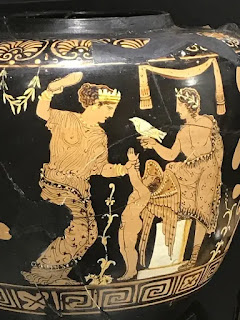Aphrodite, the First Mother to Discipline Her Child with a Sandal, Establishes a Global Tradition
In the rich tapestry of Greek mythology, stories abound that have not only entertained but also provided cultural touchstones for centuries. One such story features the Greek goddess Aphrodite and her son, Eros, in a moment that appears to have set a precedent for parental discipline still observed in various cultures around the world today. According to myth, the first instance of a mother spanking her child with a sandal involves Aphrodite threatening her mischievous son, Eros, with the back of her sandal.
Aphrodite, known as Venus to the Romans, is the goddess of love, beauty, and desire. Her son, Eros—Cupid in Roman mythology—is the god of love, often depicted as a playful and sometimes troublesome child whose antics include shooting his arrows to incite love and passion among gods and mortals alike. Eros’s behavior, while whimsical, often led to chaos and disorder, requiring his mother to rein him in.
The imagery of Aphrodite wielding a sandal to discipline Eros is both symbolic and significant. In ancient Greece, sandals were common footwear, practical and accessible. The act of using a sandal for spanking, therefore, was not only effective but also a readily available method for mothers to correct their children’s behavior. This mythological vignette encapsulates a universal parenting strategy: the need to discipline and guide children, even divine ones, in their formative years.
This method of discipline, depicted in the mythology, transcended the realm of the gods and found its way into the practices of mortal mothers. The sandal, as a tool for spanking, became embedded in the cultural practices of various societies. From the Mediterranean to the far reaches of Asia and the Americas, the sandal has been utilized in domestic discipline, often seen as a mother’s practical tool for managing unruly behavior.
In many cultures, the act of spanking with a sandal is more than just a disciplinary action; it is imbued with cultural significance and traditions passed down through generations. In Latin American cultures, for instance, the “chancla” (Spanish for sandal) holds a near-mythical status in the realm of parental discipline. The mere mention of the word can evoke memories of childhood mischief and subsequent correction. Similarly, in parts of Asia and the Middle East, the sandal has been a symbol of maternal authority and discipline.
The persistence of this practice across different cultures and eras underscores a shared understanding of parenting challenges and strategies. While modern perspectives on child discipline have evolved, with many advocating for non-physical methods, the historical and cultural impact of the sandal as a disciplinary tool remains significant. It is a testament to the enduring nature of cultural traditions and the ways in which they are informed by ancient narratives.
The goddess threatens to hit Pana with the sandal. Little Cupid hovers over her shoulder, grabbing Pan's horn.
Moreover, the story of Aphrodite and Eros offers insights into the complexities of parenting, even within the divine context. It highlights the dual role of mothers as nurturers and disciplinarians, tasked with the responsibility of guiding their children’s behavior while also providing love and support. This duality is a timeless aspect of the human experience, resonating with parents across the ages.
In conclusion, the myth of the Greek goddess Aphrodite disciplining her son Eros with a sandal has transcended its mythological origins to influence cultural practices around the world. This ancient story has laid the groundwork for a disciplinary tradition that, while varied in its application, speaks to the universal challenges of parenting. The sandal, as a symbol of maternal authority, continues to evoke a blend of respect, humor, and nostalgia in many cultures, underscoring the enduring legacy of myth in shaping human behavior and societal norms.





Σχόλια